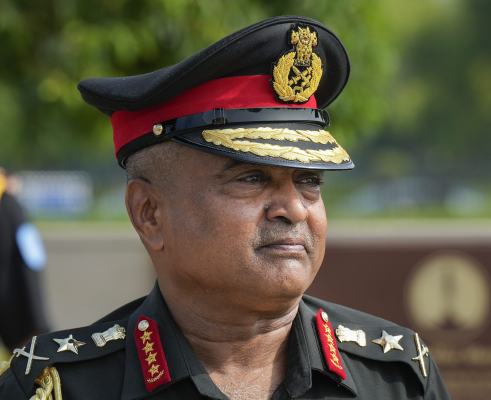
Chief of Army Staff General Manoj Pande
NEW DELHI (PTI): Warfare has transcended into new domains, such as space, cyber, electromagnetic spectrum and information systems, and India must develop indigenous capabilities to deal with future security challenges, Army Chief Gen Manoj Pande has said.
The Army chief especially underlined the importance of "technology infusion" and "self-reliance" in the armed forces, saying both are distinct yet interconnected.
Gen Pande said India must develop its indigenous military capabilities as no country will share the latest, advanced and critical technology with it.
"Warfare has transcended into new domains, such as space, cyber, electromagnetic spectrum and information. Consequent to these developments, conventional force ratios, which was the measure of military strength and superiority in the past, stand blunted today," he said.
Gen Pande made the remarks at the fourth Gen K Sundarji memorial lecture on Tuesday.
He highlighted the need for embracing technology in order to maintain a competitive edge on the battlefield.
"The imperative of technology infusion into warfighting systems and to keep pace with technological progression, remains enduring to this day," he said.
"The impact of external dependency for critical components, supply chain disruptions and weaponisation of denial regimes came to the fore, during the (Covid-19) pandemic and also from the lessons of the ongoing Russia-Ukraine conflict," he said.
"We need to recognise that no country will share the latest, advanced and critical technology with us," he said.
The Army chief said being import dependent for critical technologies entails the risk of remaining behind in niche areas.
"The answer, therefore, lies in being self-reliant and achieving self-sufficiency in critical technologies through indigenous research and development," he said.
Gen Pande said the growing centrality of cyber domain in critical infrastructure has resulted in it emerging as a new battleground of digital confrontation.
"Information operations today have gained new dimensions," he said.
"When we talk about digitisation of the battlefield, we are witness to a manifold increase in the lethality and accuracy of kinetic instruments and increased proliferation of technologies such as artificial intelligence, quantum computing, robotics and nano-technology," he said.
The Army chief said disruptive and dual use technologies and their proliferation at unprecedented scale are transforming the character of modern wars.
"A suite of digital technologies, encompassing electronic warfare, micro-electronics, drones, precision attack systems, loiter munitions and star link terminals are challenging traditional force multipliers," he said.
"Swarming is contesting surging, surveillance and precision are scoring over fire and manoeuvre, and the light and small are prevailing over the large and heavy," he added.
Gen Pande said his force has been focusing on developing indigenous capabilities.
"The Indian Army on its part, stands committed to achieve its capability development and sustenance needs through Atmanirbharta," he said.
"Modernisation and technology infusion forms one of the five pillars of the transformation roadmap, which we had put into effect, almost two years ago," he added.
The Army chief, while underscoring the thoughts of Gen Sundarji on transformation, asserted that his force is alive to the imperative of transformation.
"It is with a progressive outlook that we intend to not only change, but to change at a good pace too. The holistic transformation of the Indian Army, that we put into effect two years ago, is part of our efforts to give shape to a modern, agile, adaptive, technology enabled and self-reliant future ready force," he said.
Gen Sundarji was the Army chief from February 1, 1986 to May 31, 1988. He is known for his deep insights and strategic foresights into future warfare and security paradigms.
 Previous Article
Previous Article












The Indian Air Force, in its flight trials evaluation report submitted before the Defence Ministry l..
view articleAn insight into the Medium Multi-Role Combat Aircraft competition...
view articleSky enthusiasts can now spot the International Space Station (ISS) commanded by Indian-American astr..
view article